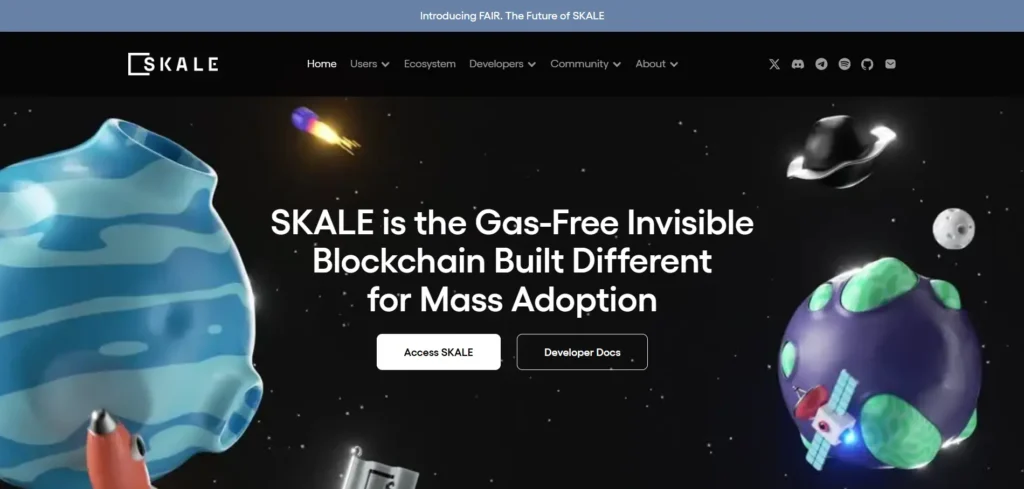Cryptocurrency tax laws vary worldwide, and the same applies to Skale (SKL). Whether you buy, sell, trade, or stake Skale, you may have to pay taxes depending on where you live and how you use your crypto. Tax authorities in your country can have different ways of treating crypto activities, so make sure you understand your obligations to comply with tax rules and avoid unexpected consequences.
This guide will break down everything you need to know about the tax treatment on Skale in plain, straightforward language.

- How to Connect Your Skale Wallet to Catax
- Are Skale (SKL) Transactions Taxable?
- Can You Deduct Trading Fees and Other Costs?
- How Is Skale (SKL) Taxed Based on Holding Time?
- How Is Staking Income from Skale Taxed?
- Can You Use Skale Losses to Lower Your Taxes?
- How to Stay Compliant with Skale (SKL) Tax Regulations?
How to Connect Your Skale Wallet to Catax
Connecting your wallet to Catax will allow you to keep track of your Skale transactions and perform your taxes on them easily. It’s a step that takes a few seconds to perform, and makes sure all of your activity is captured automatically:
- Open your Skale wallet or block explorer (such as MetaMask, Trust Wallet, Ledger, etc.).
- Locate your public wallet address and copy it.
On Catax:
- Log in to Catax and select your country.
- Choose Chain and then search for Skale Wallet.
- Paste your public address and click Connect.
Catax will now sync your transactions automatically and help you calculate your tax obligations in real-time.
Calculate My Taxes ➤Are Skale (SKL) Transactions Taxable?
Definitely, most countries consider cryptocurrency transactions to be taxable. How Skale transactions are taxed is dependent on how you use SKL:
- Selling SKL for profit: You pay capital gains tax when you sell SKL for more than you paid for it.
- Swapping SKL for other cryptocurrencies: Swapping SKL for other cryptocurrencies will generally be treated as a taxable event, even if you didn’t cash out for fiat currency.
- Paying for goods or services with SKL: If the value of Skale has increased since you bought, then you might have to pay capital gains tax when you use it to purchase something.
- Earning SKL from staking: You must report staking rewards as income in most jurisdictions when you receive SKL from staking.
- Getting paid in SKL: If someone pays you in Skale for a product or service, you typically report the SKL’s value at that time as taxable income.
Since rules for crypto tax vary from country to country, consider checking your local regulations, or use a tool like Catax which will apply the right rules based on your location.
Can You Deduct Trading Fees and Other Costs?
This is a frequently asked question from Skale users, and the response is based on the tax regulations of your country. Some countries allow deductibles for expenses incurred surrounding your crypto transactions, such as:
- Exchange fees charged for buying or selling SKL.
- Network fees that you pay to transfer your SKL between wallets.
- Security measuring costs like hardware wallets or services that secure your private keys.
Not all countries allow all of these deductions however. In some areas, only the purchase price (cost basis) may be included and not other costs. Ensure you check your local conditions or speak with your tax professional to be certain.
How Is Skale (SKL) Taxed Based on Holding Time?
Taxes on profits from Skale can have a variable tax burden depending on how long you held the tokens:
- Short-term holdings: Selling SKL within a year after acquiring it may mean you have to pay a higher tax rate, similar to income tax rates.
- Long-term holdings: If you hold on to your SKL for longer than a year, many countries give lower tax rates for long-term capital gains.
- Flat rate countries: Some countries tax at the same rate, no matter how long you held the crypto.
Knowing how your country treats crypto holding periods will assist you in knowing when the best time to sell in order to minimize tax expense.
You can also check out our Country-Specific Guide for Crypto in Your country. This guide provides insights on regulations, tax implications, and compliance measures breifly explained for each country.
How Is Staking Income from Skale Taxed?
You can earn rewards by staking Skale, but if you receive rewards they will most likely be taxed in some way. There are generally two ways countries handle staking income:
- Taxed as income – Some countries treat staking rewards as if they are income and tax you as soon as you receive the staking rewards. You would then report the staking rewards as part of your income at the end of the year.
- Taxed as capital gains – Other countries will wait until you sell or exchange your staking rewards. Once you complete a transaction, any profit is taxed.
It’s important to know how your country is treating staking, so you can correctly report your staking rewards. If your rewards are taxed as income, you may owe taxes even if you haven’t sold your staking rewards yet.
Can You Use Skale Losses to Lower Your Taxes?
Yes, if you sell your SKL for less than what you paid in many countries, you can use that loss to lower your tax bill. Here is how losses are generally managed:
- Offsetting gains: You may use any loss from Skale to offset gains made on crypto, and even stocks.
- Carrying your losses forward: If you don’t have any gains in the same tax year as your losses, some places allow you to carry losses forward to offset your tax losses in the future.
- No deduction at all: A few countries do not permit any deductions for crypto losses, so be sure to double-check your local regulations.
Just remember to keep records of all your transactions to help you corroborate your losses in the event that you ever need to.
How to Stay Compliant with Skale (SKL) Tax Regulations?
As the governments become stricter on crypto taxes, it’s essential to follow the laws and stay informed. Here are some steps to stay compliant:
- Learn how your country taxes Skale: Is it considered income, capital gains, or business income?
- Understand what expenses you can deduct: Know if you can deduct trading expenses, staking rewards, and security fees.
- Record keeping: Keep track of every Skale transaction, including buying, selling, trading, staking to spend.
- Calculate your taxes: A crypto tax calculator like Catax can help you to calculate and file your taxes correctly.
- Talk to an accountant: If you are unsure about something, it is always good to talk to a tax advisor that knows about crypto and crypt laws in your country.


